Advanced Ovarian Cancer: You Are Responsible for Your Resilience
No matter how difficult to accept, we all know life has limits. That is, there is a beginning and an end. Even the noblest will someday die. Death is not limited to social class, education, physical beauty, or wealth.
Most of us hope to better understand ourselves during this life. We try to hone our skills and seek growth in our work and the ability to relate. A common goal is to refine our engaging qualities so that we can be part of something bigger than ourselves. To do so, we exercise opportunities supporting innate desires to be connected. Yet, despite great effort, sometimes we win and sometimes lose.
While reaching success in many areas, we are hardly immune to bad things happening. Loss seems to be a more frequent visitor as we grow into adulthood. Along the way, we experience the loss of loved ones. Sometimes we are challenged by location changes and even have to face a loss of dignity and a diminished sense of competence.
While extremely painful, we learn lessons of vulnerability and grief. Yet, with the lessons come an awakening of our resilience - the belief that we can handle many things that come before us.
Facing ovarian cancer
For those of us facing a diagnosis of ovarian cancer at any stage, there is an immediate new awareness, often amounting to fear and sadness.
I would also guess that most readers agree and acknowledge the reality of life and death. However, suddenly it is no longer out there happening to someone else. For the first time, you may face circumstances that limit your life and your time on this earth.
More importantly, I have learned that the most significant loss is the loss of me and thee.
Accepting responsibility
Somewhere along the way, I learned that if you expect others to make you happy, you will always be disappointed. You alone are responsible for your destiny. For many of us, this is all part of the fight for our life through cancer. In the stages of surgery and chemotherapy, and when unable to fully care for ourselves, we easily enter a sick role.
In 1951, the American Sociologist Talcott Parsons coined this phenomenon. The general idea is that the "individual who has fallen ill is not only physically sick but now adheres to the specifically patterned social role of being sick." He calls this a deviance from society. And so it begins that when in this place, it is often difficult for us to find our way back.
With a usual determination to get beyond all this, I realize now that there are times we must accept being sick to get the help we need. Nevertheless, I firmly believe that the challenge is not to remain in a state where we lose all hope of resuming independence.
Finding your resilience
Accepting responsibility to be resilient requires taking steps in sometimes unfamiliar territory. It may involve:
- Making sense of this new life where cancer becomes a centerpiece of activity.
- The strength of mind and body can no longer be taken for granted. Your energy may need to be parceled to times of have-to.
- Look for experiences of comfort and joy. Beyond required doctor visits and infusions, remind yourself of the life you want to have.
- Practice feeling empathy for fellow human beings.
- Let go of negativity and judgment.
- Engage in positive emotional experiences. Reach out to other teal warriors and congratulate them for their courage.
- Step outside of yourself and get in touch with the experience of those you love.
Although you may have pain and suffering in your life, remember that the whole of you includes a beautiful soul full of love and gratitude. I leave you my peace and love.
What has your experience with resiliency looked like in the battle against ovarian cancer?
Editor’s Note: We are extremely saddened to say that on August 9, 2024, Ellen Reed passed away. Ellen’s advocacy efforts and writing continue to reach many. She will be deeply missed.


Join the conversation